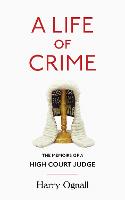


|
|
| book details |
A Life of Crime: The Memoirs of a High Court Judge
By (author) Harry Ognall

|
| on special |
normal price: R 310.95
Price: R 294.95
|
| book description |
A frank and witty memoir of life at the Bar and on the Bench, from former High Court Judge The Hon. Sir Harry Ognall. For many years, Harry Ognall enjoyed a formidable reputation as an advocate at the criminal Bar. As counsel, and later as judge, he was involved in numerous high-profile trials, both in Britain and abroad. Among many cases as a QC, he prosecuted Peter Sutcliffe, the so-called `Yorkshire Ripper'. He successfully defended six officers of the Air Force of Zimbabwe at their trial in Harare, where they faced a charge of treasonable sabotage. As a judge, he presided over the trial of Colin Stagg (the alleged `Wimbledon Common murderer'), the trial arising from the Lyme Bay canoe tragedy and the trial for the first time in the United Kingdom of a doctor's alleged involvement in euthanasia. Thoughtful and provocative, Sir Harry has advice for the aspiring young advocate, and invests this penetrating memoir with warmth, humour and understanding. His frank portrait of a lifetime in the criminal law offers unique perspectives on some of the most notorious cases of the twentieth century, as well as fascinating insights into a colourful professional life and the burdens and responsibilities that come with the privilege of high judicial office.
| product details |

Normally shipped |
Publisher | HarperCollins Publishers
Published date | 2 Nov 2017
Language |
Format | Hardback
Pages | 160
Dimensions | 222 x 141 x 17mm (L x W x H)
Weight | 280g
ISBN | 978-0-0082-6746-9
Readership Age |
BISAC | biography & autobiography / lawyers & judges
| other options |
|
|
|
To view the items in your trolley please sign in.
| sign in |
|
|
|
| specials |
|
|
An epic love story with the pulse of a thriller that asks: what would you risk for a second chance at first love?
|

|
Mason Coile
Paperback / softback
224 pages
was: R 542.95
now: R 488.95
|
A terrifying locked-room mystery set in a remote outpost on Mars.
|
|
|
|
|